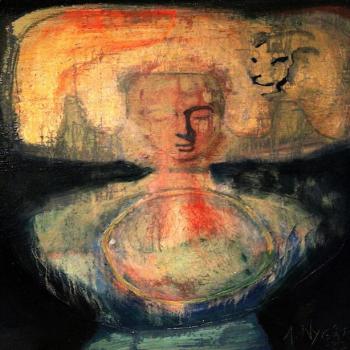On a chilly winter night in 1933, Bill Wilson hit rock bottom. A New York City-based traveling businessman, Wilson had gone on a drinking binge. For the fourth time, he was committed to a hospital on Manhattan’s Upper West Side. He was treated with a concoction of drugs. Only this time was different. Wilson had what he termed “a white light experience.” In his words:
“I found myself crying out, “If there is a God, let Him show Himself. I am ready to do anything!” Suddenly the room lit up with a great white light. I was caught up in an ecstasy which there are no words to describe.”
Wilson reported that as the ecstasy subsided, he entered “a new world of consciousness. All about me and through me there was a wonderful feeling of Presence. A great peace stole over me.” This sense of a greater presence was strong enough to “cure” him from his alcoholism. He went on to form an entity called the Fellowship to help other alcoholics find the light. The group would later be reframed as Alcoholics Anonymous (AA).
Meet the man who helped spread the AA Gospel: Eugene Exman
The A.A. story is told by Stephen Prothero in God The Bestseller and is one of several told in the new book. But in this tale, Wilson isn’t the only luminary. A key cohort is Eugene Exman, an editor and publishing executive at Harper who helped publish books by some of the biggest names of the mid-20th century. This included the Catholic radical Dorothy Day, Nobel laureate Albert Schweitzer, and Martin Luther King Jr.
Exman’s life trajectory was altered by a strange experience. As a teenager growing up in rural Ohio, he was on a horse one day when he was suddenly surrounded by “a great light.” He later reported that “he was invaded.” He felt himself being lifted up and out of his body. The light faded and he returned to his body. He was certain that he had just experienced the presence of God.
This mystical encounter helped inform Exman’s career as he sought out others who also had been touched by God. This included Bill Wilson who was struggling to raise money to support the fledgling Alcoholics Anonymous. Wilson decided to get his message out by writing a book—what would become known as The Big Book. It was comprised of 29 stories of those who had overcome alcoholism, as well as the now famous 12 steps.
Wilson brought the book to Exman who wanted to publish The Big Book at Harper. But Wilson didn’t think the 15% commission he would make would bring in enough revenue to support his organization. Exman agreed and told Wilson he was so impressed by the book and Wilson’s cause, that he would help him self-publish. He got the book professionally designed and the two men became fast friends.
The prerequisite for recovery from alcoholism: an encounter with God.
Prothero writes that Wilson believed the gateway to recovery for an alcoholic was an experience of a Higher Power—and it did not matter what you understood God to be. Because he wanted people from all religions to attend AA, Wilson began using the phrase a “Higher Power” rather than “God,” and “spiritual experiences” rather than “religious experiences.”
There were 12 clearly defined steps to be taken if you wanted to move from drunkenness to sobriety. But there was one key aspect: If you wanted to stay sober you had to lean on a Higher Power, a force greater than yourself. According to Prothero, the process worked like this:
- The alcoholic had to realize they couldn’t cure themselves
- They needed to turn to a Higher Power for help
- By doing this, they experienced a spiritual awakening
- Through a combination of luck and grace they were able to live without alcohol
What mattered most was that the alcoholic gave up on trying to master the situation through will power, but instead relied on “a force outside himself.” Wilson believed there were 2 paths open to the alcoholic. Either proceed on your own, which would lead to “destruction and death,” or enlist the aid of a personal God of one’s choosing. Prothero writes that:
The Big Book welcomed virtually any conception of God and refused to judge those conceptions against any standard other than whether they worked for a particular individual.
Exman praised AA for understanding that “God is not primarily a theological concept but a power in time of need.” And Wilson steadfastly believed there were a number of ways God could be found. He did not prescribe a specific religious approach, stating “we have no desire to convince anyone that the true God can only be discovered in some particular way.” He continued:
True religion isn’t about church. Or dogma. Or clerics. Or rituals. True religion is open rather than closed, broad rather than narrow, pluralistic rather than exclusive, empathetic rather than judgmental.
AA had a huge impact on the way we see religion today.
The Big Book took off when the Saturday Evening Post featured a story on Alcoholics Anonymous and their unique approach to treating alcoholism. Prothero reports that “at the beginning of 1941, before the article appeared, there were 2,000 AAs nationwide. At the end of 1941, that figure had jumped to 8,000.” The book became a bestseller and still sells well.
The book had an impact on religion and society that is still felt today. AA helped usher in the idea of being “spiritual but not religious” and in Prothero’s words, “placed experience at the heart of the religious lives of many Americans, pushing dogma and ritual to the periphery.” In this new type of religion:
- Experience was valued over dogma
- Diversity was valued over unity
- Religious practices were judged by their fruits
The key to success was (and is) the personal spiritual experience. While organized religion was suspicious of the spiritual experience, Exman believed that “the churches offer salvation not to mystics but to those who follow the routine of the system.” What was needed was a break from the system and finding a religion of one’s own.
This core message of AA may be one reason why today, according to a 2021 Pew Research study, one in 4 Americans describes themselves as “spiritual but not religious.” At the same time, church attendance continues to drop year after year. AA helped introduce the idea of “God without religion”—and it’s an idea that has stuck and continues to grow.

















